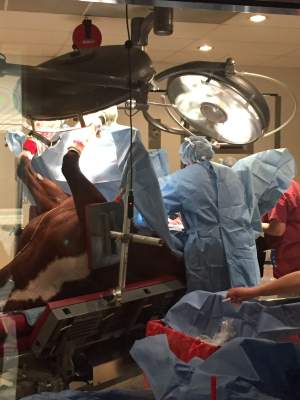Mid-Rivers Equine Centre is a well-equipped facility with highly trained staff available 24/7 to assist your horse in a colic emergency. While colic is a common digestive disorder, it can become quite serious and is the number one cause of pre-mature deaths in horse. The ability to provide emergency colic surgery and save lives was the driving factor behind establishing Mid-Rives Equine Centre. (Hospital Admissions Form)

It is estimated 10% of horses suffering from colic are good candidates for colic surgery
It is estimated 10% of horses suffering from colic are candidates for colic surgery.
Does Your Horse Require Emergency Colic Surgery?
Our doctors will determine whether or not your horse requires colic surgery using one or all of the follow tests:
- A rectal exam can be performed to evaluate the bowel that is within arm’s length and this can be helpful in determining the cause of the problem and the prognosis. If the exam reveals abnormal positioning of the bowel, the next step would be to pass a naso-gastric tube.
- A naso-gastric tube allows the veterinarian to determine if there is fluid accumulating in the stomach. This fluid, which is called reflux, can be a sign of a small intestinal obstruction or ileus. Ileus is a condition wherein the bowel is not moving as if it’s paralyzed. If there is no reflux, then mineral oil or some other laxative is given using a stomach pump.
- An abdominal tap is performed to obtain a sample of peritoneal or abdominal fluid for testing. A clear, yellow fluid with little protein content is relatively normal while a reddish, cloudy fluid is evidence of a very sick horse. If the abdominal tap is normal, fluid therapy might resolve the problem but if the pain persists, an abdominal ultrasound may be warranted.
- An abdominal ultrasound is an evaluation of the intestines to determine motility or movement, called peristalsis, as well as relative location with the abdomen and in relation to other organs.
For cases where the root cause is difficult to identify, we typically start the patient on fluids, and manage their pain giving them time. By doing this, we are essentially letting the horse tell us what the next steps will be.
What To Expect During Emergency Colic Surgery
If we determined your horse has to undergo colic surgery, here is what you can expect from the procedure:
The horse is anesthetized and placed on the surgery table, and where we will continually monitor its vital signs with an EKG and a pulse oximeter. An arterial catheter is placed for blood pressure assessment and blood gas sample collection.
The procedure begins with an evaluation of the location of the different segments of the bowel and any abnormalities are corrected. If there are any sections of compromised or dying bowel, a resection of those segments may be required. If an enterolith is found, it is removed. An enterotomy may be performed and the contents of the large colon are evacuated.
After the abnormality has been corrected, the tissues of the abdominal wall are closed and the patient is moved to recovery. Due to the nature of horses, some may get panicky in recovery as they emerge disoriented from the anesthesia. To help ensure their safety, horse recover in our fully padded induction stall where they are assisted to stand. As soon as they are stable, a full body bandage is applied to relieve pressure on the abdominal incision and they are moved back to their stall to resume fluid therapy.
Patients are on antibiotics and are typically re-introduced to feed on day two or three. The average colic surgery patient is discharged in 7 days and their recovery usually takes about 90-120 days.
Keep Your Veterinarian Up To Date
After your horse is discharged, closely monitor their behavior and health and inform your veterinarian if you have any concerns or there is any unusual discharge or excessive swelling at the incision site. Your veterinarian will perform routine checkups to ensure the health of your horse and if they are ready for turnout or normal activity.